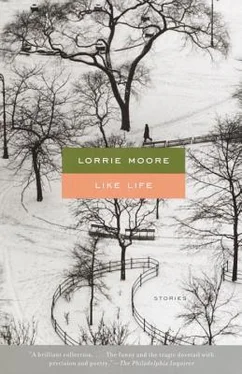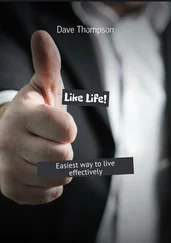People filed out from the Newark customs gate, released and weary, one of them a thin, red-haired boy of about twenty. He lit a cigarette, scanned the crowd, and then, spying Millie, headed toward her. He wore an old, fraying camel hair sports jacket, sneakers of blue, man-made suede, and a baseball cap, which said Yankees , an ersatz inscription.
“Are you Mrs. Keegan?” he asked, pronouncing it Kaygan.
“Um, yes, I am,” Millie said, and blushed as if surprised. She let the sign, which with its crayoned and overblown message now seemed ludicrous, drop to her side. Her other hand she thrust out in greeting. She tried to smile warmly but wondered if she looked “fakey,” something Ariel sometimes accused her of. “It’s like you’re doing everything from a magazine article,” Ariel had said. “It’s like you’re trying to be happy out of a book.” Millie owned several books about trying to be happy.
John shifted his cigarette into his other hand and shook Millie’s. “John Spee,” he said. He pronounced it Spay. His hand was big and bony, like a chicken claw.
“Well, I hope your flight was uneventful,” said Millie.
“Oh, not really,” said John. “Sat next to a bloke with stories about the Vietnam War and watched two movies about it. The Deer Hunter and, uh, I forget the other.” He seemed apprehensive yet proud of himself for having arrived where he’d arrived.
“Do you have any more luggage than that? Is that all you have?”
“ ’Zall I got!” he chirped, holding a small duffel bag and turning around just enough to let Millie see his U.S. Army knapsack.
“You don’t want this sign, do you?” asked Millie. She creased it, folded it in quarters like a napkin, and shoved it into her own bag. Over the PA system a woman’s voice was repeating, “Mr. Boone, Mr. Daniel Boone. Please pick up the courtesy line.”
“Isn’t that funny,” said Millie.
On the drive home to Terracebrook, John Spee took out a pack of Johnny Parliaments and chain-smoked. He told Millie about his life in Surrey, his mates at the pub there, in a suburb called Worcester Park. “Never was much of a student,” he said, “so there was no chance of me going to university.” He spoke of the scarcity of work and of his “flash car,” which he had sold to pay for the trip. He had worked six years as an auto mechanic, a job that he had quit to come here. “I may stay in the States a long time,” he said. “I’m thinking of New York City. Wish I hadn’t had to sell me flash car, though.” He looked out at a souped-up Chevrolet zooming by them.
“Yes, that’s too bad,” said Millie. What should she say? On the car radio there was news of the garbage barge, and she turned it up to hear. It had been rejected by two states and two foreign countries, and was floating, homeless, toward Texas. “I used to have a kind of business,” she explained to John. “It was in garbage and trash recycling. Nothing really came of it, though.” The radio announcer was quoting something now. The wretched refuse of our teeming shores , he was saying. Yeah, yeah, yeah , he was saying.
“Now I’m taking a college course through the mail,” Millie said, then reddened. This had been her secret. Even Hane didn’t know. “Don’t tell my husband,” she added quickly. “He doesn’t know. He doesn’t quite approve of my interest in business. He’s a teacher. Religious studies at the junior college.”
John gazed out at the snag of car dealerships and the fast-food shacks of Route 22. “Is he a vicar or something?” He inhaled his cigarette, holding the smoke in like a thought.
“Oh, no,” said Millie. She sighed a little. Hane did go to church every Sunday. He was, she knew, a faithful man. She herself had stopped going regularly over a year ago. Now she went only once in a while, like a visit to an art museum, and it saddened Hane, but she just couldn’t help it. “It’s not my thing,” she had said to her husband. It was a phrase she had heard Ariel use, and it seemed a good one, powerful with self-forgiveness, like Ariel herself.
“The traffic on this route is almost always heavy,” said Millie. “But everyone drives very fast, so it doesn’t slow you down.”
John glanced sideways at her. “You look a little like Ariel,” he said.
“Really?” said Millie brightly, for she had always thought her daughter too pretty to have come from Hane and her. Ariel had the bones and eyes of someone else, the daughter of royalty, or a movie star. Mitzi Gaynor’s child. Or the Queen’s. Ironically, it had been Michael, their eldest, who had seemed so clearly theirs.
“Oh, yes,” said John. “You don’t think so?”
USUALLY in spring Millie hurried guests immediately out into the backyard so that they could see her prize tulips — which really weren’t hers at all but had belonged to the people who owned the house before them. The woman had purchased prize bulbs and planted them even into the edge of the next-door neighbor’s yard. The yards were small, for sure, but the couple had been a young managerial type, and Millie had thought perhaps aggressive gardening went with such people.
Millie swung the car into the driveway and switched off the ignition. “I’ll spare you the tulips for now,” she said to John. “You probably would like to rest. With jet lag and all.”
“Yeah,” said John. He got out of the car and swung his duffel bag over his shoulder. He surveyed the identical lawns, still a pale, wintry ocher, and the small, boxy split-levels, their stingy porches fronting the entrances like goatees. He looked startled. He thought we were going to be rich Americans , thought Millie. “Are you tired?” she said aloud.
“Not so bad.” He breathed deeply and started to perspire. Millie went up the steps, took a key out from behind the black metal mailbox, and opened the door. “Our home is yours,” she said, swinging her arms wide, showing him in.
John stepped in with a lit cigarette between his teeth, his eyes squinting from the smoke. He put his bag and knapsack down and looked about the living room. There were encyclopedias and ceramic figurines. There were some pictures of Ariel placed high on a shelf. Much of the furniture was shredded and old. There was a Bible and a Time magazine on the coffee table.
“Let me show you your room,” said Millie, and she took him down a short corridor and opened the door on the right. “This was once my son’s room,” she said, “but he’s — he’s no longer with us.” John nodded somberly. “He’s not dead,” Millie hastened to add, “he’s just not with us.” She cleared her throat — there was something in it, a scratch, a bruise of words. “He left home ten years ago, and we never heard from him again. The police said drugs.” Millie shrugged. “Maybe it was drugs.”
John was looking for a place to flick his ashes. Millie grabbed a potted begonia from the sill and held it out for him. “There’s a desk and a filing cabinet here, which I was using for my business, so you can just ignore those.” On the opposite wall there was a cot and a blond birch dresser. “Let me know if you need anything. Oh! Towels are in the bathroom, on the back of the door.”
“Thanks,” said John, and he looked at his watch like a man with plans.
“LEFTOVERS is all we’ve got tonight!” Millie emerged from the kitchen with quilted pot-holder mittens and a large cast-iron skillet. She beamed like the presenters on the awards shows she sometimes watched; she liked to watch TV when it was full of happiness.
Hane, who had met John coming out of the bathroom and had mumbled an embarrassed how-do-you-do, now sat at the head of the dining room table, waiting to serve the food. John sat kitty-corner, Michael’s old place. He regarded the salad bowl, the clover outlines of the peppers, the clock stares of the tomato slices. He had taken a shower and parted his wet hair rather violently on the left.
Читать дальше












